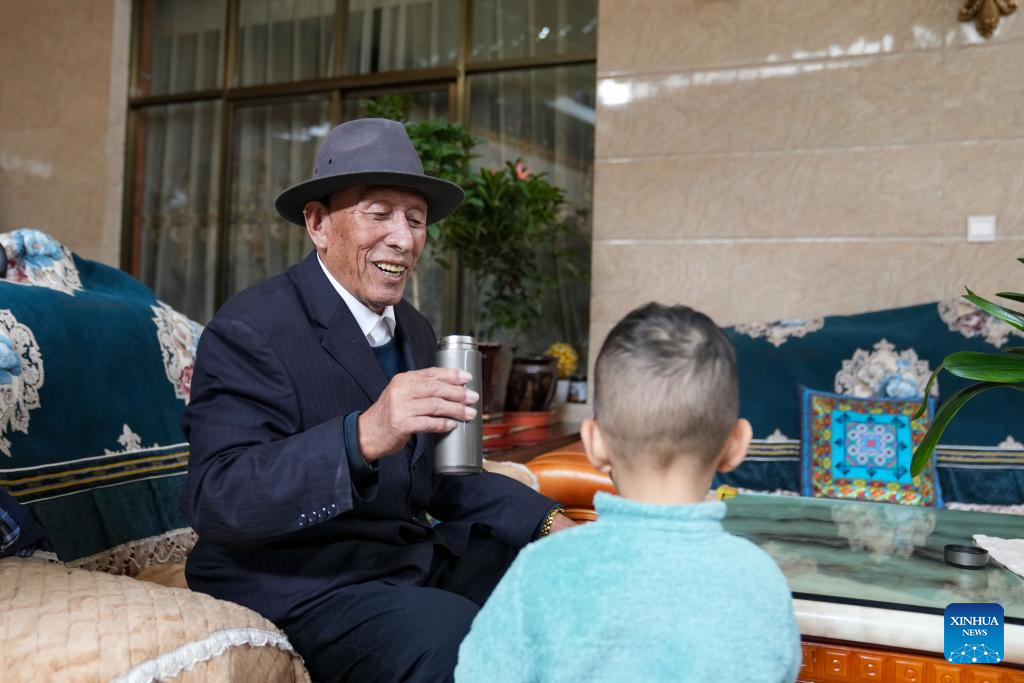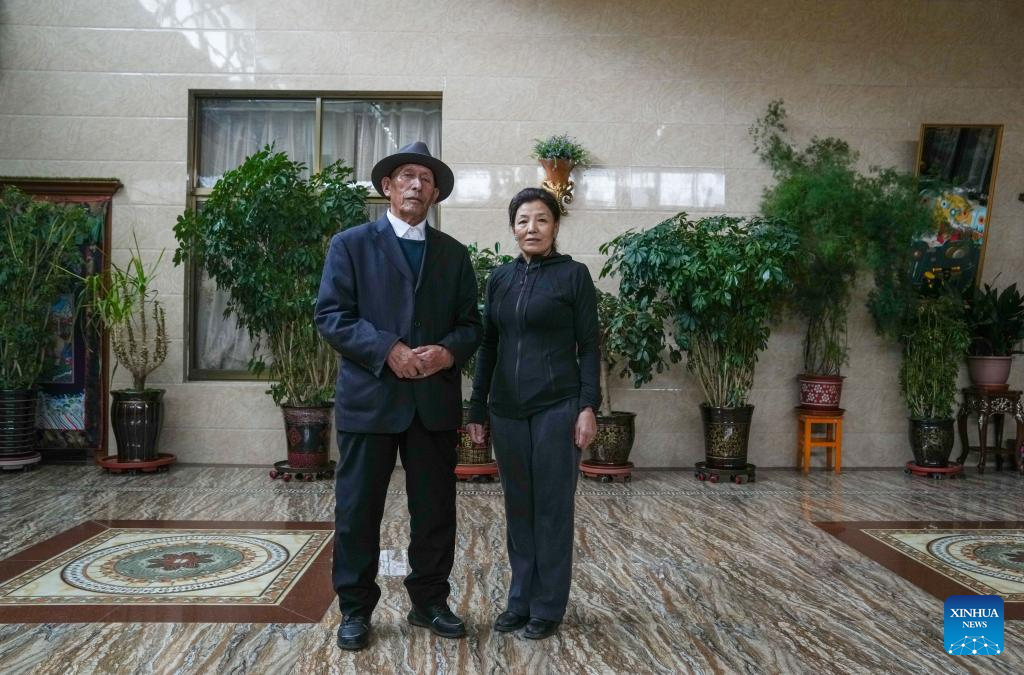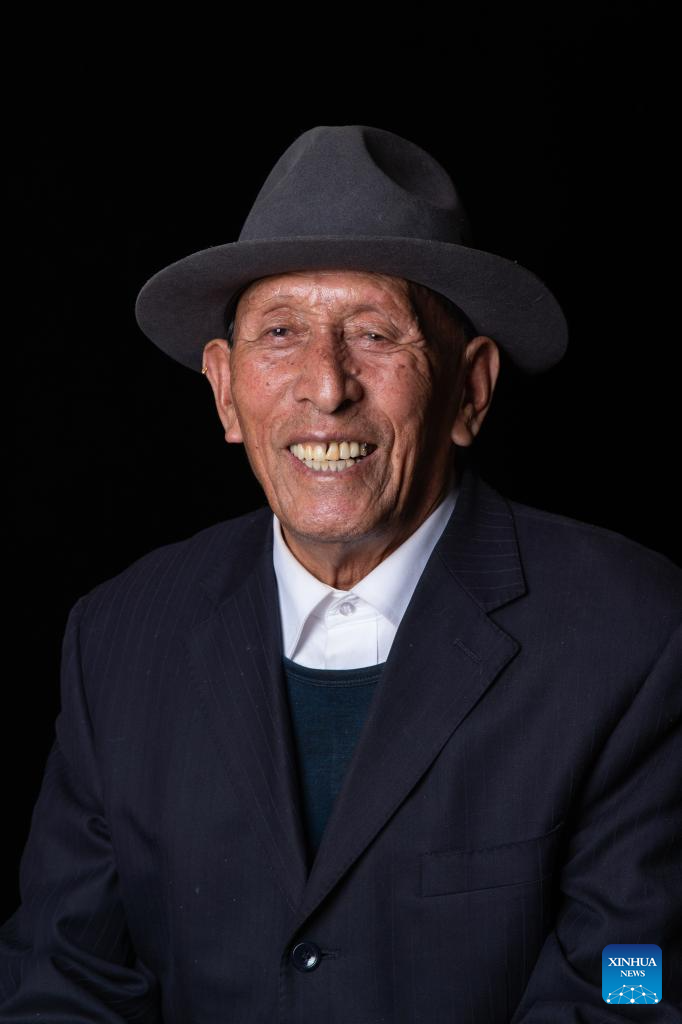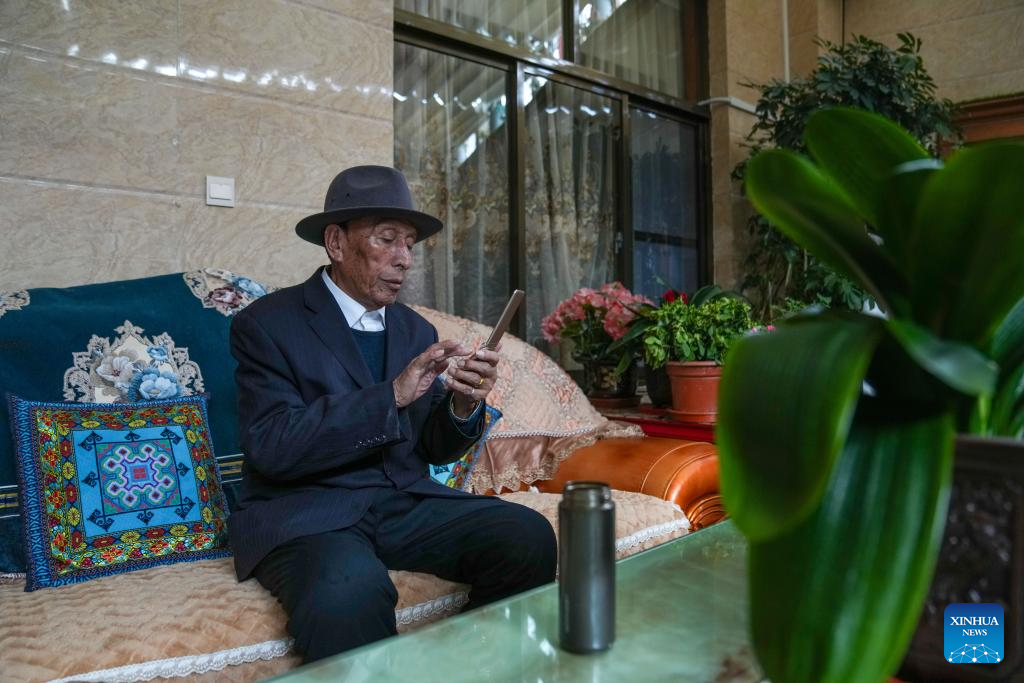
Lozang waters plants at his house in Kundeling Street, Chengguan District of Lhasa, southwest China's Xizang Autonomous Region, April 2, 2024. Born in 1939, Lozang is a resident of Kundeling Street of Chengguan District in Lhasa.
Before the democratic reform, Lozang and his family were serfs, working for Kundeling Monastery. During his childhood, Lozang worked as a muleteer and was obliged to transport supplies, only receiving meager sustenance in return.
In March 1959, people in Xizang launched the democratic reform that ended the region's feudal serfdom. Lozang was freed and allocated accommodations.
In 1960, he was appointed head of the residents' committee in his community, and elected as a deputy to the National People's Congress.
Now retired, Lozang lives with his family in a three-story house. His eldest and second daughters run a tea shop in downtown Lhasa, and his younger daughter works in a bank. Lozang said he was very happy to take care of his grandchildren at home and exercise occasionally in the park. (Xinhua/Tenzing Nima Qadhup)

Lozang plays with his grandchild at his house in Kundeling Street, Chengguan District of Lhasa, southwest China's Xizang Autonomous Region, April 2, 2024. Born in 1939, Lozang is a resident of Kundeling Street of Chengguan District in Lhasa.
Before the democratic reform, Lozang and his family were serfs, working for Kundeling Monastery. During his childhood, Lozang worked as a muleteer and was obliged to transport supplies, only receiving meager sustenance in return.
In March 1959, people in Xizang launched the democratic reform that ended the region's feudal serfdom. Lozang was freed and allocated accommodations.
In 1960, he was appointed head of the residents' committee in his community, and elected as a deputy to the National People's Congress.
Now retired, Lozang lives with his family in a three-story house. His eldest and second daughters run a tea shop in downtown Lhasa, and his younger daughter works in a bank. Lozang said he was very happy to take care of his grandchildren at home and exercise occasionally in the park. (Xinhua/Kel Sang Ballsjor)

Lozang presents his ID card in Lhasa, southwest China's Xizang Autonomous Region, Dec. 7, 2021. Born in 1939, Lozang is a resident of Kundeling Street of Chengguan District in Lhasa.
Before the democratic reform, Lozang and his family were serfs, working for Kundeling Monastery. During his childhood, Lozang worked as a muleteer and was obliged to transport supplies, only receiving meager sustenance in return.
In March 1959, people in Xizang launched the democratic reform that ended the region's feudal serfdom. Lozang was freed and allocated accommodations.
In 1960, he was appointed head of the residents' committee in his community, and elected as a deputy to the National People's Congress.
Now retired, Lozang lives with his family in a three-story house. His eldest and second daughters run a tea shop in downtown Lhasa, and his younger daughter works in a bank. Lozang said he was very happy to take care of his grandchildren at home and exercise occasionally in the park. (Xinhua/Jigme Dorje)

Lozang poses for a photo with his wife at his house in Kundeling Street, Chengguan District of Lhasa, southwest China's Xizang Autonomous Region, April 2, 2024. Born in 1939, Lozang is a resident of Kundeling Street of Chengguan District in Lhasa.
Before the democratic reform, Lozang and his family were serfs, working for Kundeling Monastery. During his childhood, Lozang worked as a muleteer and was obliged to transport supplies, only receiving meager sustenance in return.
In March 1959, people in Xizang launched the democratic reform that ended the region's feudal serfdom. Lozang was freed and allocated accommodations.
In 1960, he was appointed head of the residents' committee in his community, and elected as a deputy to the National People's Congress.
Now retired, Lozang lives with his family in a three-story house. His eldest and second daughters run a tea shop in downtown Lhasa, and his younger daughter works in a bank. Lozang said he was very happy to take care of his grandchildren at home and exercise occasionally in the park. (Xinhua/Tenzing Nima Qadhup)

Lozang is pictured at his house in Kundeling Street, Chengguan District of Lhasa, southwest China's Xizang Autonomous Region, April 2, 2024. Born in 1939, Lozang is a resident of Kundeling Street of Chengguan District in Lhasa.
Before the democratic reform, Lozang and his family were serfs, working for Kundeling Monastery. During his childhood, Lozang worked as a muleteer and was obliged to transport supplies, only receiving meager sustenance in return.
In March 1959, people in Xizang launched the democratic reform that ended the region's feudal serfdom. Lozang was freed and allocated accommodations.
In 1960, he was appointed head of the residents' committee in his community, and elected as a deputy to the National People's Congress.
Now retired, Lozang lives with his family in a three-story house. His eldest and second daughters run a tea shop in downtown Lhasa, and his younger daughter works in a bank. Lozang said he was very happy to take care of his grandchildren at home and exercise occasionally in the park. (Xinhua/Tenzing Nima Qadhup)

Lozang uses a mobile phone at his house in Kundeling Street, Chengguan District of Lhasa, southwest China's Xizang Autonomous Region, April 2, 2024. Born in 1939, Lozang is a resident of Kundeling Street of Chengguan District in Lhasa.
Before the democratic reform, Lozang and his family were serfs, working for Kundeling Monastery. During his childhood, Lozang worked as a muleteer and was obliged to transport supplies, only receiving meager sustenance in return.
In March 1959, people in Xizang launched the democratic reform that ended the region's feudal serfdom. Lozang was freed and allocated accommodations.
In 1960, he was appointed head of the residents' committee in his community, and elected as a deputy to the National People's Congress.
Now retired, Lozang lives with his family in a three-story house. His eldest and second daughters run a tea shop in downtown Lhasa, and his younger daughter works in a bank. Lozang said he was very happy to take care of his grandchildren at home and exercise occasionally in the park. (Xinhua/Kel Sang Ballsjor)



